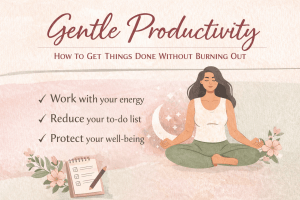As we embrace the changing seasons and transition into the refreshing atmosphere of spring, it’s an ideal moment to renew our surroundings and our state of mind. Spring cleaning is more than a mere household chore; it’s an essential practice that brings significant benefits to our mental health.
An orderly environment reduces stress and enhances our overall sense of well-being. Let’s delve into the profound connection between a clutter-free space and mental clarity, uncovering the benefits of spring cleaning and practical tips to embark on this journey.
The Connection Between Clutter and Mental Health
How Clutter Affects Our Mind
Clutter has a surprisingly powerful impact on our mental state. Disorganized and cluttered environments contribute to heightened stress levels, as they visually and mentally overwhelm us. Elevated cortisol levels, the body’s primary stress hormone, are often a result of living in cluttered spaces. The constant bombardment of visual stimuli from clutter can lead to anxiety, depression, and decreased cognitive function. Imagine trying to focus or relax when you’re surrounded by chaos—it’s an impossible task!
Scientific Evidence
Scientific research supports the negative effects of clutter on mental health. For instance, a study by the UCLA Center on Everyday Lives and Families (CELF) revealed that the number of objects in a household is directly linked to increased stress levels, especially in women. The sense of disorder from clutter can disrupt our ability to concentrate, process information, and enjoy restful sleep.
Real-Life Examples
Picture the sensation of stepping into a well-organized, tidy space versus a cluttered, chaotic room. The former exudes tranquility and relaxation, while the latter often sparks feelings of unease and anxiety. Numerous personal anecdotes emphasize the transformative experiences of those who have decluttered their homes, highlighting the substantial impact of a clean environment on their mental health.
Benefits of Spring Cleaning for Mental Health
Reduced Stress and Anxiety
The immediate benefit of spring cleaning is the noticeable reduction in stress and anxiety. A clutter-free space fosters a serene environment, allowing you to relax and unwind. The act of cleaning itself can be incredibly therapeutic, providing a sense of control and accomplishment that positively impacts mental well-being.
Increased Focus and Productivity
An organized space remarkably enhances focus and productivity. With everything in its rightful place, locating items and completing tasks becomes easier and more efficient. A tidy workspace contributes to better concentration, helping you tackle projects and meet deadlines without the distractions of clutter.
Improved Mood and Sense of Accomplishment
Cleaning and organizing boost your mood and foster a sense of achievement. The physical activity involved in cleaning releases endorphins, the body’s natural feel-good chemicals. Completing cleaning tasks offers a sense of accomplishment, boosting your confidence and overall happiness.
Practical Tips for Effective Spring Cleaning
Start Small and Set Realistic Goals
Embarking on a spring cleaning journey can be daunting, so it’s vital to start small and set realistic goals. Begin with one room or even a specific area within a room. Break down tasks into manageable steps, such as organizing a drawer or sorting through a closet. Setting achievable goals helps maintain motivation and prevents feelings of being overwhelmed.
Decluttering Strategies
Several effective decluttering strategies can guide you through the process:
-
The KonMari Method: Popularized by Marie Kondo, this method involves categorizing items and keeping only those that “spark joy.” It encourages a mindful approach to decluttering, focusing on gratitude and intentionality.
-
The Four-Box Technique: Label four boxes as “keep,” “donate,” “discard,” and “relocate.” As you sort through your belongings, place each item in one of these boxes. This method streamlines the decluttering process, ensuring that each item has a designated place.
Organizational Tools and Techniques for Improving Mental Health
Using organizational tools and techniques helps maintain order in your home. Invest in storage solutions like bins, baskets, and shelves to keep items organized and easily accessible. Organize different areas of your home—like the kitchen, bedroom, and living room—to create a cohesive and functional living space.
Maintaining a Clutter-Free Environment
Establishing Daily Habits
Maintaining a clutter-free environment requires consistent effort and daily habits. Dedicate a few minutes each day to tidying up and putting things back in their designated places. Regular maintenance prevents clutter from accumulating and ensures your space remains organized.
Mindful Purchasing and Consumption
Adopting a minimalist mindset and mindful purchasing habits help prevent future clutter. Before making new purchases, consider whether they add value to your life and if you truly need them. Avoid impulse buying and focus on quality over quantity.
Conclusion
Spring cleaning is more than a seasonal chore—it’s a powerful practice that significantly enhances mental health and overall well-being. Decluttering your living space not only reduces stress but also boosts focus and lifts your mood. Moreover, embracing the transformative process of spring cleaning allows you to enjoy a more organized, serene, and joyful living environment. Therefore, start today and experience the profound benefits of a clutter-free home.














